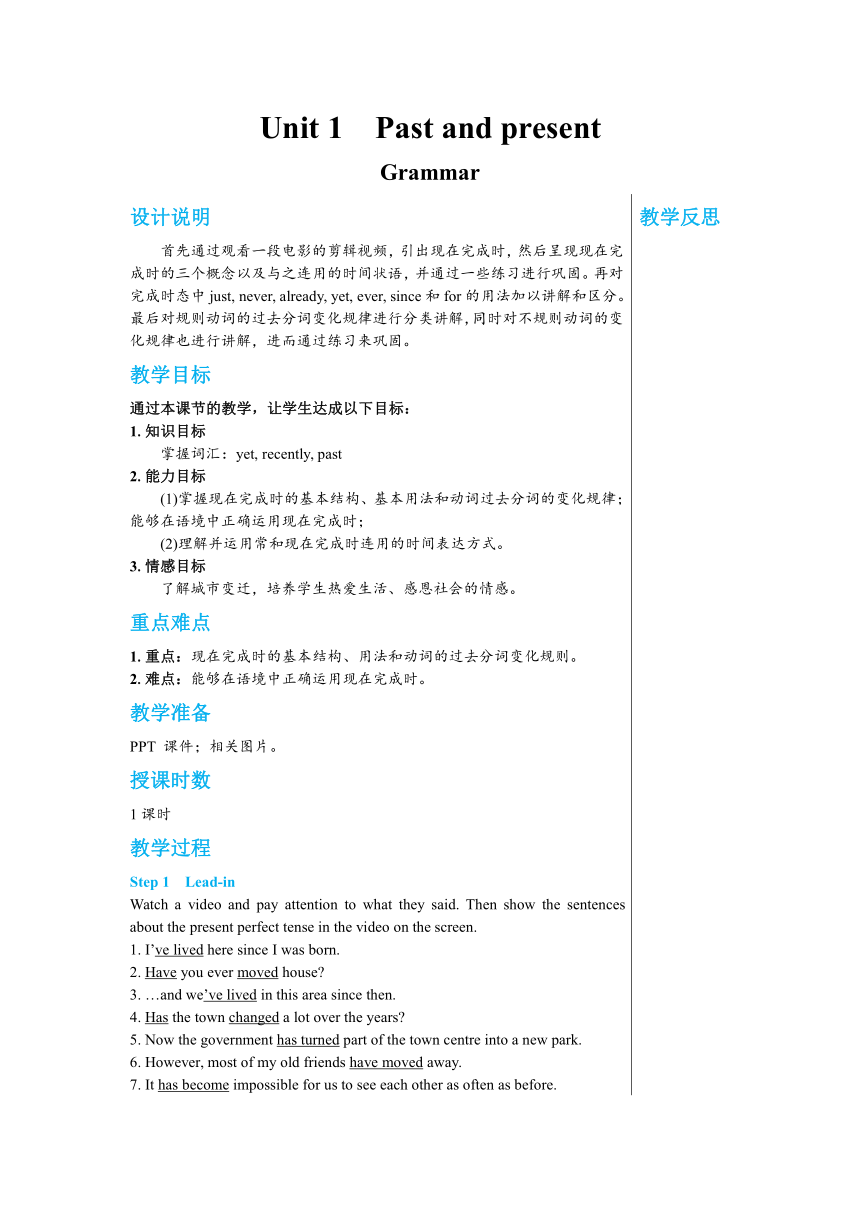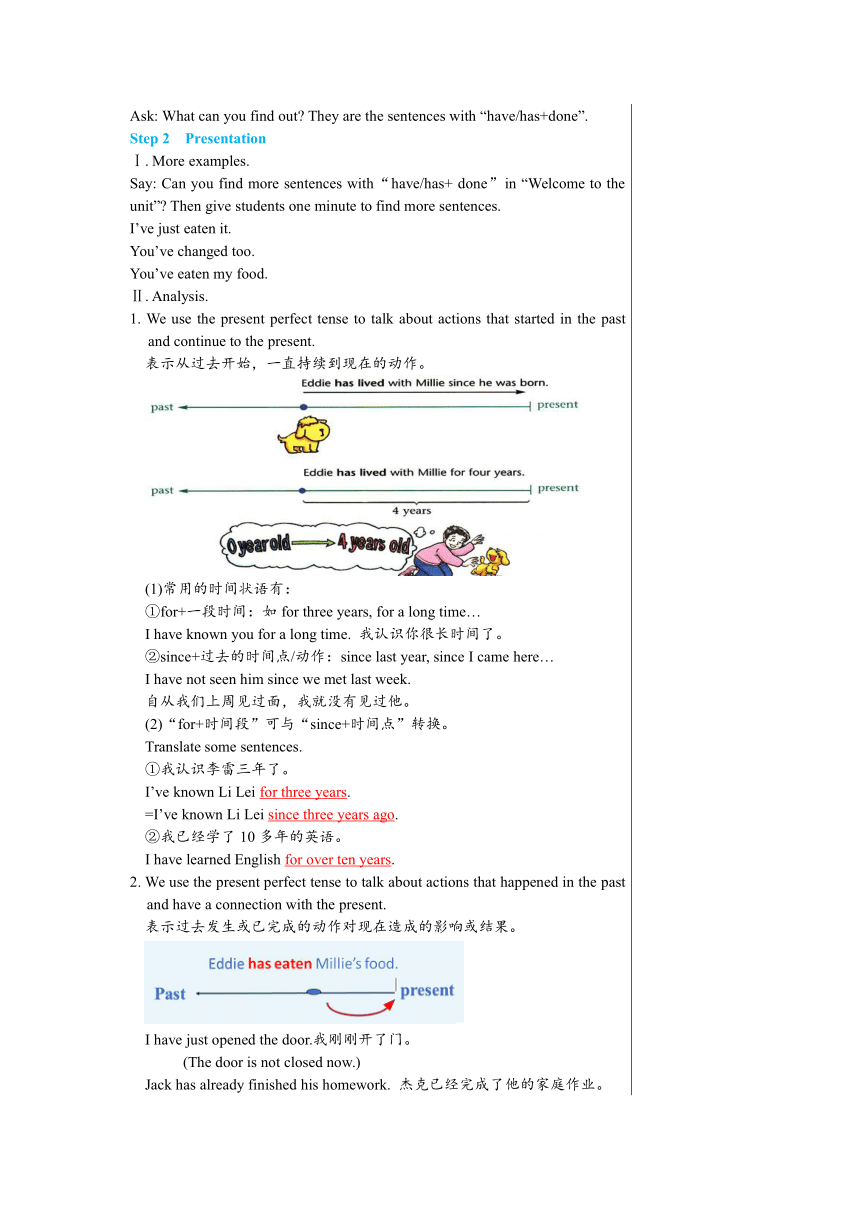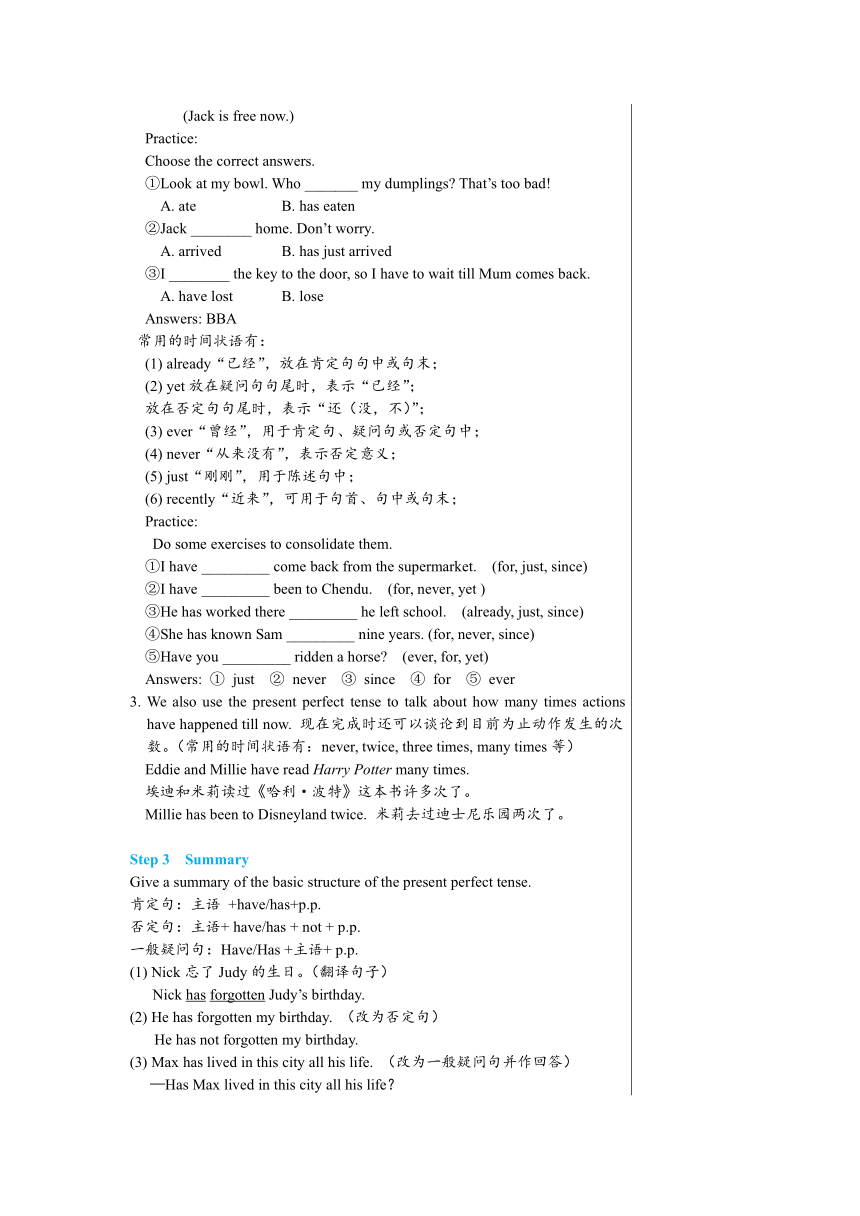Unit 1 Grammar教学详案--牛津译林版中学英语八年级下
文档属性
| 名称 | Unit 1 Grammar教学详案--牛津译林版中学英语八年级下 |

|
|
| 格式 | docx | ||
| 文件大小 | 111.1KB | ||
| 资源类型 | 试卷 | ||
| 版本资源 | 牛津译林版 | ||
| 科目 | 英语 | ||
| 更新时间 | 2024-02-21 19:41:09 | ||
图片预览



文档简介
Unit 1 Past and present
Grammar
设计说明 首先通过观看一段电影的剪辑视频,引出现在完成时,然后呈现现在完成时的三个概念以及与之连用的时间状语,并通过一些练习进行巩固。再对完成时态中just, never, already, yet, ever, since和for的用法加以讲解和区分。最后对规则动词的过去分词变化规律进行分类讲解,同时对不规则动词的变化规律也进行讲解,进而通过练习来巩固。 教学目标 通过本课节的教学,让学生达成以下目标: 1.知识目标 掌握词汇:yet, recently, past 2.能力目标 (1)掌握现在完成时的基本结构、基本用法和动词过去分词的变化规律;能够在语境中正确运用现在完成时; (2)理解并运用常和现在完成时连用的时间表达方式。 3.情感目标 了解城市变迁,培养学生热爱生活、感恩社会的情感。 重点难点 1.重点:现在完成时的基本结构、用法和动词的过去分词变化规则。 2.难点:能够在语境中正确运用现在完成时。 教学准备 PPT 课件;相关图片。 授课时数 1课时 教学过程 Step 1 Lead-in Watch a video and pay attention to what they said. Then show the sentences about the present perfect tense in the video on the screen. 1. I’ve lived here since I was born. 2. Have you ever moved house 3. …and we’ve lived in this area since then. 4. Has the town changed a lot over the years 5. Now the government has turned part of the town centre into a new park. 6. However, most of my old friends have moved away. 7. It has become impossible for us to see each other as often as before. Ask: What can you find out They are the sentences with “have/has+done”. Step 2 Presentation Ⅰ. More examples. Say: Can you find more sentences with“have/has+ done”in “Welcome to the unit” Then give students one minute to find more sentences. I’ve just eaten it. You’ve changed too. You’ve eaten my food. Ⅱ. Analysis. 1. We use the present perfect tense to talk about actions that started in the past and continue to the present. 表示从过去开始,一直持续到现在的动作。 (1)常用的时间状语有: ①for+一段时间:如for three years, for a long time… I have known you for a long time. 我认识你很长时间了。 ②since+过去的时间点/动作:since last year, since I came here… I have not seen him since we met last week. 自从我们上周见过面,我就没有见过他。 (2)“for+时间段”可与“since+时间点”转换。 Translate some sentences. ①我认识李雷三年了。 I’ve known Li Lei for three years. =I’ve known Li Lei since three years ago. ②我已经学了10多年的英语。 I have learned English for over ten years. 2. We use the present perfect tense to talk about actions that happened in the past and have a connection with the present. 表示过去发生或已完成的动作对现在造成的影响或结果。 I have just opened the door.我刚刚开了门。 (The door is not closed now.) Jack has already finished his homework. 杰克已经完成了他的家庭作业。 (Jack is free now.) Practice: Choose the correct answers. ①Look at my bowl. Who _______ my dumplings That’s too bad! A. ate B. has eaten ②Jack ________ home. Don’t worry. A. arrived B. has just arrived ③I ________ the key to the door, so I have to wait till Mum comes back. A. have lost B. lose Answers: BBA 常用的时间状语有: (1) already“已经”,放在肯定句句中或句末; (2) yet放在疑问句句尾时,表示“已经”; 放在否定句句尾时,表示“还(没,不)”; (3) ever“曾经”,用于肯定句、疑问句或否定句中; (4) never“从来没有”,表示否定意义; (5) just“刚刚”,用于陈述句中; (6) recently“近来”,可用于句首、句中或句末; Practice: Do some exercises to consolidate them. ①I have _________ come back from the supermarket. (for, just, since) ②I have _________ been to Chendu. (for, never, yet ) ③He has worked there _________ he left school. (already, just, since) ④She has known Sam _________ nine years. (for, never, since) ⑤Have you _________ ridden a horse (ever, for, yet) Answers: ① just ② never ③ since ④ for ⑤ ever 3. We also use the present perfect tense to talk about how many times actions have happened till now. 现在完成时还可以谈论到目前为止动作发生的次数。(常用的时间状语有:never, twice, three times, many times等) Eddie and Millie have read Harry Potter many times. 埃迪和米莉读过《哈利·波特》这本书许多次了。 Millie has been to Disneyland twice. 米莉去过迪士尼乐园两次了。 Step 3 Summary Give a summary of the basic structure of the present perfect tense. 肯定句:主语 +have/has+p.p. 否定句:主语+ have/has + not + p.p. 一般疑问句:Have/Has +主语+ p.p. (1) Nick忘了Judy的生日。(翻译句子) Nick has forgotten Judy’s birthday. (2) He has forgotten my birthday. (改为否定句) He has not forgotten my birthday. (3) Max has lived in this city all his life. (改为一般疑问句并作回答) —Has Max lived in this city all his life? —Yes, he has./ No, he hasn’t. Step 4 Lead-in 1. Learn the rules the past participle of regular verbs. Most verbs+ edwash→washedVerbs ending in -e+ dlive→livedVerbs ending in a consonant + y-y + iedstudy→studiedShort verbs ending in a vowel+ a consonantdouble the consonant + edstop→stopped
2. Learn the rules of irregular verbs. (1) Changing the letters. No changecome → come hurt → hurtChange the vowelhold → held win → wonChange the consonantlend → lent build → builtChange the vowel(s) and the consonant(s)catch → caught keep → kept forget → forgotten tell → toldOthersbe → been have → had fall → fallen fly → flown draw → drawn see → seen
(2) Different spelling forms among original, p.t and p.p. Typeoriginalp.tp.pAAAcostcostcostABAcomecamecomerunranrunABBgetgotgotcatchcaughtcaughtABCseesawseenforgetforgotforgottendrinkdrankdrunkgrowgrewgrowneatateeaten
Turn to Pages 122 ~ 123 for more changes of irregular verbs. Step 5 Practice 1. Play a game. Give some words and ask the students to say the past participles as soon as possible. 2. Finish Part A on Page 14. Then check the answers. (1) borrow _______ (2) hope ___________ (3) make _________ (4) get __________ (5) plan ____________ (6) cry___________ (7) send_________ (8) watch___________ (9) say __________ (10) grow________ (11) hit ____________ (12) enjoy________ Answers: (1) borrowed (2) hoped (3) made (4) got (5) planned (6) cried (7) sent (8) watched (9) said (10) grown (11) hit (12) enjoyed Step 6 Practice 1. Finish Part B on Page 14. Then check the answers. (1) They __________(finish) their homework already. (2) John __________ never __________ (visit) China. (3) Mr Li ____________(repair) over ten bicycles since Monday. (4) We_____________ (not see) each other for years. (5) My parents ______________ (not come) back yet. (6) Our teacher ___________ (teach) us a lot about the history of China. Answers: (1) have finished (2) has, visited (3) has repaired (4) haven’t seen (5) haven’t seen (6) has taught 2. Finish Part C on Page 14. Then check the answers. Millie: (1) ________ you ________ (see) any films recently, Sandy Sandy: No, I haven’t. What about you Millie: Well, I (2)________ (see) one last Saturday. Sandy: What is it about Millie: It’s about the changes in Beijing over the past century. From this film, I (3) ___________(learn) more about Beijing’s past and present. Sandy: Oh, I think I (4)__________ (hear) about the film. Do you plan to see it again Millie: Yes, I’d like to. Answers: (1) Have, seen (2) saw (3) have learnt (4) have heard Step 7 Homework 1. Review the summary on present perfect tense. 2. Finish the exercises on the workbook. 当堂达标 I. 写出下列单词的过去分词。 1. arrive________ 2. become________ 3. begin_________ 4. study________ 5. build__________ 6. stop__________ 7. cost_________ 8. meet__________ 9. enjoy_________ 10. eat_________ 11. plan__________ 12. fall__________ 13. fly_________ 14. think__________ 15. know________ II. 用括号中所给动词的现在完成时填空。 1. Recently thousands of fans _________(meet) in Los Angeles to show their respect to the famous basketball players. 2. I _______________ (not finish) the work yet. 3. _________ their government _______ (take) action to stop the epidemic yet 4. I ____________ (not hear) from my brother for a long time. 5. Many cinemas ___________ (be) closed since January 25. III. 用括号内所给动词适当形式填空。 Recently we __________(read) lots of news about the novel coronavirus(新型冠状病毒). The Chinese government has taken active action to protect its people as well as those around the world. However, there _________ (be) many more cases outside China since January 13. WHO experts just ________ (discuss) the issue with the Chinese side. They say our government _________ already _________ (do) a great job in fighting against the novel coronavirus. China will continue working with WHO. We are sure China is able to control the outbreak. Now the situation ________(be) under control. As middle school students, we should try our best to protect ourselves. The best way is to stay at home and wash our hands often. If we have to go out, we must wear a mask. Remember we are the one who can fill the world with sunshine. Answers:I. 1. arrived 2. become 3. begun 4. studied 5. built 6. stopped 7. cost 8. met 9. enjoyed 10. eaten 11. planned 12. fallen 13. flown 14. thought 15. known II. 1. have met 2. haven’t finished 3. Has, taken 4. haven’t heard 5. have been III. have read;have been;have discussed;has, done;has been 板书设计 Unit 1 Past and present GrammarNew words: yet recently pastPhrases: over the past century earn more about
教学反思
Grammar
设计说明 首先通过观看一段电影的剪辑视频,引出现在完成时,然后呈现现在完成时的三个概念以及与之连用的时间状语,并通过一些练习进行巩固。再对完成时态中just, never, already, yet, ever, since和for的用法加以讲解和区分。最后对规则动词的过去分词变化规律进行分类讲解,同时对不规则动词的变化规律也进行讲解,进而通过练习来巩固。 教学目标 通过本课节的教学,让学生达成以下目标: 1.知识目标 掌握词汇:yet, recently, past 2.能力目标 (1)掌握现在完成时的基本结构、基本用法和动词过去分词的变化规律;能够在语境中正确运用现在完成时; (2)理解并运用常和现在完成时连用的时间表达方式。 3.情感目标 了解城市变迁,培养学生热爱生活、感恩社会的情感。 重点难点 1.重点:现在完成时的基本结构、用法和动词的过去分词变化规则。 2.难点:能够在语境中正确运用现在完成时。 教学准备 PPT 课件;相关图片。 授课时数 1课时 教学过程 Step 1 Lead-in Watch a video and pay attention to what they said. Then show the sentences about the present perfect tense in the video on the screen. 1. I’ve lived here since I was born. 2. Have you ever moved house 3. …and we’ve lived in this area since then. 4. Has the town changed a lot over the years 5. Now the government has turned part of the town centre into a new park. 6. However, most of my old friends have moved away. 7. It has become impossible for us to see each other as often as before. Ask: What can you find out They are the sentences with “have/has+done”. Step 2 Presentation Ⅰ. More examples. Say: Can you find more sentences with“have/has+ done”in “Welcome to the unit” Then give students one minute to find more sentences. I’ve just eaten it. You’ve changed too. You’ve eaten my food. Ⅱ. Analysis. 1. We use the present perfect tense to talk about actions that started in the past and continue to the present. 表示从过去开始,一直持续到现在的动作。 (1)常用的时间状语有: ①for+一段时间:如for three years, for a long time… I have known you for a long time. 我认识你很长时间了。 ②since+过去的时间点/动作:since last year, since I came here… I have not seen him since we met last week. 自从我们上周见过面,我就没有见过他。 (2)“for+时间段”可与“since+时间点”转换。 Translate some sentences. ①我认识李雷三年了。 I’ve known Li Lei for three years. =I’ve known Li Lei since three years ago. ②我已经学了10多年的英语。 I have learned English for over ten years. 2. We use the present perfect tense to talk about actions that happened in the past and have a connection with the present. 表示过去发生或已完成的动作对现在造成的影响或结果。 I have just opened the door.我刚刚开了门。 (The door is not closed now.) Jack has already finished his homework. 杰克已经完成了他的家庭作业。 (Jack is free now.) Practice: Choose the correct answers. ①Look at my bowl. Who _______ my dumplings That’s too bad! A. ate B. has eaten ②Jack ________ home. Don’t worry. A. arrived B. has just arrived ③I ________ the key to the door, so I have to wait till Mum comes back. A. have lost B. lose Answers: BBA 常用的时间状语有: (1) already“已经”,放在肯定句句中或句末; (2) yet放在疑问句句尾时,表示“已经”; 放在否定句句尾时,表示“还(没,不)”; (3) ever“曾经”,用于肯定句、疑问句或否定句中; (4) never“从来没有”,表示否定意义; (5) just“刚刚”,用于陈述句中; (6) recently“近来”,可用于句首、句中或句末; Practice: Do some exercises to consolidate them. ①I have _________ come back from the supermarket. (for, just, since) ②I have _________ been to Chendu. (for, never, yet ) ③He has worked there _________ he left school. (already, just, since) ④She has known Sam _________ nine years. (for, never, since) ⑤Have you _________ ridden a horse (ever, for, yet) Answers: ① just ② never ③ since ④ for ⑤ ever 3. We also use the present perfect tense to talk about how many times actions have happened till now. 现在完成时还可以谈论到目前为止动作发生的次数。(常用的时间状语有:never, twice, three times, many times等) Eddie and Millie have read Harry Potter many times. 埃迪和米莉读过《哈利·波特》这本书许多次了。 Millie has been to Disneyland twice. 米莉去过迪士尼乐园两次了。 Step 3 Summary Give a summary of the basic structure of the present perfect tense. 肯定句:主语 +have/has+p.p. 否定句:主语+ have/has + not + p.p. 一般疑问句:Have/Has +主语+ p.p. (1) Nick忘了Judy的生日。(翻译句子) Nick has forgotten Judy’s birthday. (2) He has forgotten my birthday. (改为否定句) He has not forgotten my birthday. (3) Max has lived in this city all his life. (改为一般疑问句并作回答) —Has Max lived in this city all his life? —Yes, he has./ No, he hasn’t. Step 4 Lead-in 1. Learn the rules the past participle of regular verbs. Most verbs+ edwash→washedVerbs ending in -e+ dlive→livedVerbs ending in a consonant + y-y + iedstudy→studiedShort verbs ending in a vowel+ a consonantdouble the consonant + edstop→stopped
2. Learn the rules of irregular verbs. (1) Changing the letters. No changecome → come hurt → hurtChange the vowelhold → held win → wonChange the consonantlend → lent build → builtChange the vowel(s) and the consonant(s)catch → caught keep → kept forget → forgotten tell → toldOthersbe → been have → had fall → fallen fly → flown draw → drawn see → seen
(2) Different spelling forms among original, p.t and p.p. Typeoriginalp.tp.pAAAcostcostcostABAcomecamecomerunranrunABBgetgotgotcatchcaughtcaughtABCseesawseenforgetforgotforgottendrinkdrankdrunkgrowgrewgrowneatateeaten
Turn to Pages 122 ~ 123 for more changes of irregular verbs. Step 5 Practice 1. Play a game. Give some words and ask the students to say the past participles as soon as possible. 2. Finish Part A on Page 14. Then check the answers. (1) borrow _______ (2) hope ___________ (3) make _________ (4) get __________ (5) plan ____________ (6) cry___________ (7) send_________ (8) watch___________ (9) say __________ (10) grow________ (11) hit ____________ (12) enjoy________ Answers: (1) borrowed (2) hoped (3) made (4) got (5) planned (6) cried (7) sent (8) watched (9) said (10) grown (11) hit (12) enjoyed Step 6 Practice 1. Finish Part B on Page 14. Then check the answers. (1) They __________(finish) their homework already. (2) John __________ never __________ (visit) China. (3) Mr Li ____________(repair) over ten bicycles since Monday. (4) We_____________ (not see) each other for years. (5) My parents ______________ (not come) back yet. (6) Our teacher ___________ (teach) us a lot about the history of China. Answers: (1) have finished (2) has, visited (3) has repaired (4) haven’t seen (5) haven’t seen (6) has taught 2. Finish Part C on Page 14. Then check the answers. Millie: (1) ________ you ________ (see) any films recently, Sandy Sandy: No, I haven’t. What about you Millie: Well, I (2)________ (see) one last Saturday. Sandy: What is it about Millie: It’s about the changes in Beijing over the past century. From this film, I (3) ___________(learn) more about Beijing’s past and present. Sandy: Oh, I think I (4)__________ (hear) about the film. Do you plan to see it again Millie: Yes, I’d like to. Answers: (1) Have, seen (2) saw (3) have learnt (4) have heard Step 7 Homework 1. Review the summary on present perfect tense. 2. Finish the exercises on the workbook. 当堂达标 I. 写出下列单词的过去分词。 1. arrive________ 2. become________ 3. begin_________ 4. study________ 5. build__________ 6. stop__________ 7. cost_________ 8. meet__________ 9. enjoy_________ 10. eat_________ 11. plan__________ 12. fall__________ 13. fly_________ 14. think__________ 15. know________ II. 用括号中所给动词的现在完成时填空。 1. Recently thousands of fans _________(meet) in Los Angeles to show their respect to the famous basketball players. 2. I _______________ (not finish) the work yet. 3. _________ their government _______ (take) action to stop the epidemic yet 4. I ____________ (not hear) from my brother for a long time. 5. Many cinemas ___________ (be) closed since January 25. III. 用括号内所给动词适当形式填空。 Recently we __________(read) lots of news about the novel coronavirus(新型冠状病毒). The Chinese government has taken active action to protect its people as well as those around the world. However, there _________ (be) many more cases outside China since January 13. WHO experts just ________ (discuss) the issue with the Chinese side. They say our government _________ already _________ (do) a great job in fighting against the novel coronavirus. China will continue working with WHO. We are sure China is able to control the outbreak. Now the situation ________(be) under control. As middle school students, we should try our best to protect ourselves. The best way is to stay at home and wash our hands often. If we have to go out, we must wear a mask. Remember we are the one who can fill the world with sunshine. Answers:I. 1. arrived 2. become 3. begun 4. studied 5. built 6. stopped 7. cost 8. met 9. enjoyed 10. eaten 11. planned 12. fallen 13. flown 14. thought 15. known II. 1. have met 2. haven’t finished 3. Has, taken 4. haven’t heard 5. have been III. have read;have been;have discussed;has, done;has been 板书设计 Unit 1 Past and present GrammarNew words: yet recently pastPhrases: over the past century earn more about
教学反思
